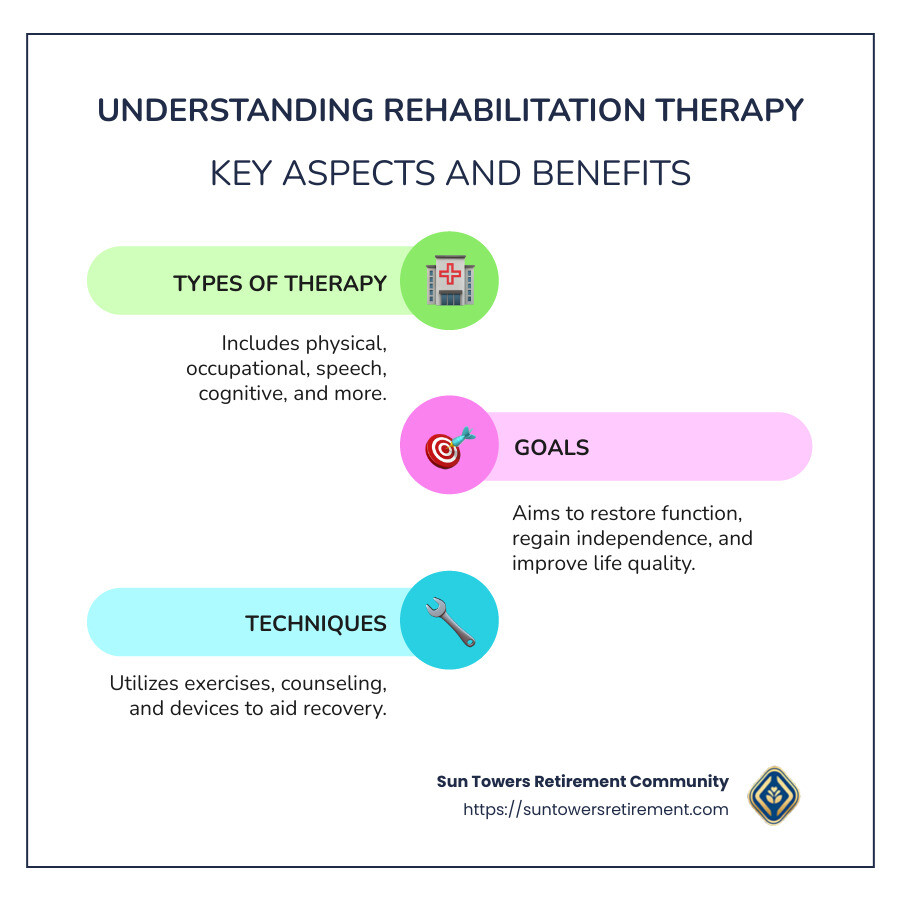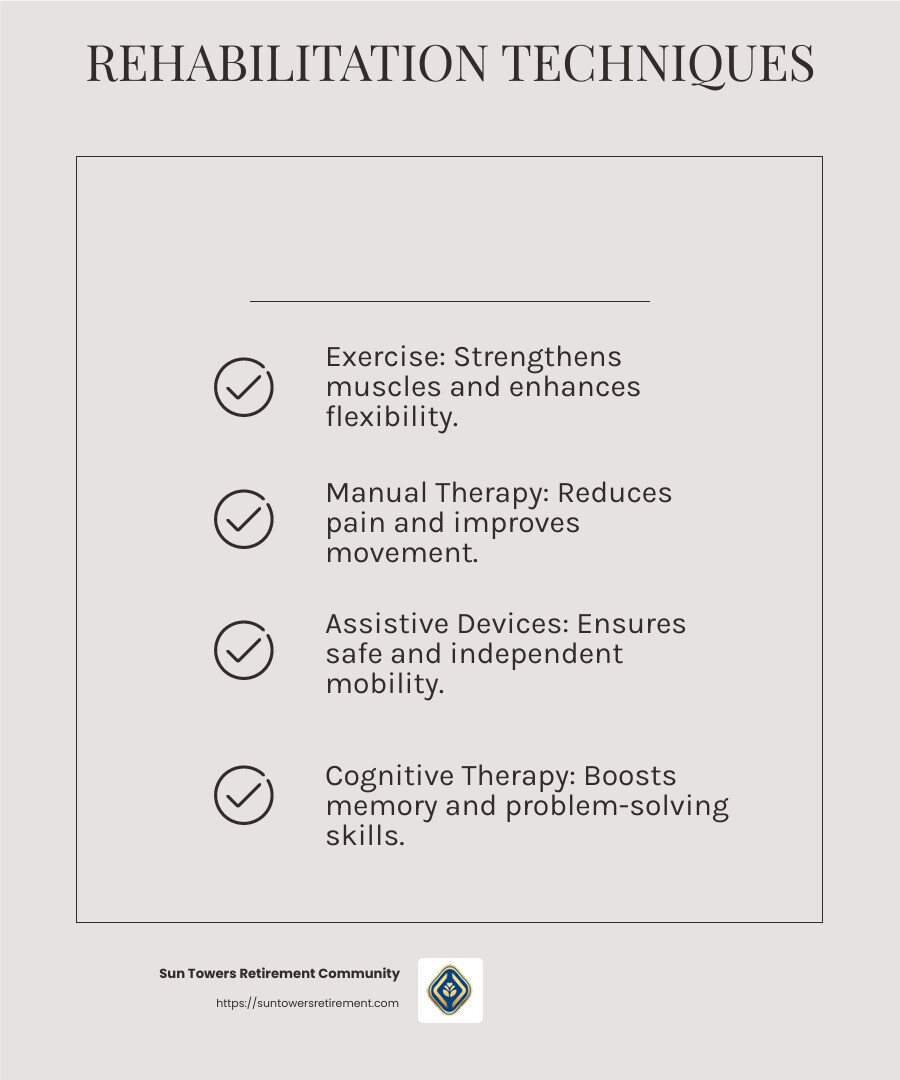What is Rehabilitation Therapy: Top 6 Essential Insights
What is rehabilitation therapy? It’s a specialized type of care that is designed to help individuals recover from various health challenges, aiming to restore independence and improve quality of life. Whether it’s helping a senior regain mobility after surgery, supporting cognitive functions post-stroke, or assisting with recovery from chronic conditions, rehabilitation therapy plays a pivotal role in daily life.
Rehabilitation therapy encompasses a wide range of services. It might include physical exercises to boost mobility, mental health counseling, or even nutritional advice to ensure a holistic approach to recovery. The goal is simple: help individuals regain their abilities—be they physical, mental, or cognitive—so they can enjoy a vibrant and active lifestyle. This is especially crucial for aging individuals who want to maintain their independence.
At Sun Towers Retirement Community in Florida, this becomes part of a seamless experience. Here, our approach ensures that every individual receives the personalized care they need, enabling them to transition smoothly from independent living to any necessary skilled care, while still feeling part of a supportive community.
What is rehabilitation therapy vocab to learn:
– outpatient neurological rehabilitation
– outpatient rehabilitation for stroke patients
– occupational therapy cost after insurance accepted
What is Rehabilitation Therapy?
Types of Rehabilitation Therapy
Rehabilitation therapy is about restoring abilities—whether they are physical, mental, or cognitive—to help individuals lead fulfilling daily lives. Let’s break down the different types of rehabilitation therapy and how they support recovery.
Physical Therapy
Physical therapy focuses on improving movement and reducing pain. It involves exercises and techniques to improve strength, balance, and flexibility. For example, after a knee replacement, physical therapy helps patients regain mobility and walk confidently again.
Occupational Therapy
Occupational therapy is all about helping people perform everyday tasks. This could mean teaching someone to use adaptive tools for dressing or cooking. It’s especially beneficial for those recovering from injuries or living with disabilities.
Speech Therapy
Speech therapy assists individuals with communication and swallowing issues. Whether it’s helping a child with speech delays or an adult relearning to speak after a stroke, this therapy can make a significant difference in daily interactions.
Respiratory Therapy
Respiratory therapy aids those with breathing difficulties. It helps patients learn techniques to breathe easier and manage conditions like asthma or COPD. This can be life-changing for someone struggling with chronic respiratory issues.
Cognitive Rehabilitation
Cognitive rehabilitation focuses on improving memory, attention, and problem-solving skills. It’s crucial for individuals recovering from brain injuries or dealing with conditions like dementia. This therapy can help patients regain independence in managing daily tasks.
Vocational Rehabilitation
Vocational rehabilitation prepares individuals to return to work. This type of therapy is essential for those recovering from injuries or illnesses that have impacted their ability to perform job-related tasks. It focuses on building skills and confidence to re-enter the workforce.
Each type of rehabilitation therapy is custom to meet specific needs, ensuring a comprehensive approach to recovery. At Sun Towers Retirement Community, our dedicated team provides these therapies to support residents in regaining their abilities and enjoying an active lifestyle. Whether it’s through physical exercises or cognitive training, we are committed to enhancing the quality of life for everyone in our care.
Goals of Rehabilitation Therapy
The goals of rehabilitation therapy are centered around three main objectives: restoring function, regaining independence, and improving quality of life. Each person’s journey through rehabilitation is unique, with specific goals custom to their individual needs and circumstances.
Restoring Function
One primary aim is to help individuals regain their lost abilities. This could be physical, like walking after a hip surgery, or cognitive, such as improving memory after a brain injury. Therapists work closely with patients to design personalized treatment plans that focus on restoring these functions. For instance, musculoskeletal injuries often require exercises to rebuild strength and flexibility.
Regaining Independence
Rehabilitation therapy also focuses on helping people become more self-sufficient. This is crucial for those who have experienced a loss of independence due to an injury or illness. For example, a stroke survivor might work on dressing and bathing independently. By tailoring therapies to each person, therapists help patients regain their autonomy, which is vital for their self-esteem and daily living.
Improving Quality of Life
Beyond physical recovery, rehabilitation therapy aims to improve the overall quality of life. This involves addressing not just the physical but also the mental and emotional well-being. Techniques like music or art therapy can be used to boost mood and provide emotional support, while nutritional counseling ensures patients are receiving the right nutrients to aid their recovery.
Specific Goals
Each patient will have specific goals based on their condition and personal aspirations. For example, someone with a lung disease might aim to walk longer distances without shortness of breath, while a cardiac patient might focus on returning to their favorite physical activities. These goals are continuously assessed and adjusted as progress is made.
At Sun Towers Retirement Community, we understand the importance of setting clear, achievable goals for rehabilitation therapy. Our multidisciplinary team is dedicated to supporting residents every step of the way, ensuring they achieve their personal milestones and enjoy a fulfilling life.
Common Rehabilitation Techniques
Rehabilitation therapy uses a variety of techniques to help individuals regain their abilities and improve their quality of life. Let’s explore some of the most common methods used by therapists.
Exercise
Exercise is a cornerstone of rehabilitation. It helps improve strength, balance, and flexibility. For example, a physical therapist might guide a patient through exercises to rebuild muscle after surgery or injury. Regular exercise also boosts mood and overall health.
Manual Therapy
Manual therapy involves hands-on techniques to reduce pain and improve movement. This can include massage, stretching, and joint mobilization. It’s especially helpful for those with musculoskeletal issues, providing relief and enhancing mobility.
Assistive Devices
Assistive devices like walkers, canes, or wheelchairs play a crucial role in rehabilitation. They help individuals move safely and independently. Occupational therapists often teach patients how to use these devices effectively to improve their daily activities.
Cognitive Therapy
Cognitive therapy focuses on improving memory, attention, and problem-solving skills. It’s vital for individuals recovering from brain injuries or strokes. Techniques may include memory exercises and problem-solving tasks designed to boost cognitive function.
Mental Health Counseling
Mental health is a key component of rehabilitation. Counseling provides emotional support and coping strategies for dealing with the challenges of recovery. It helps patients manage stress and anxiety, which can significantly impact their overall well-being.
Nutritional Counseling
Proper nutrition supports healing and recovery. Nutritional counseling ensures patients receive the right nutrients to aid their rehabilitation process. A balanced diet can improve energy levels and support physical recovery, making it a vital part of a comprehensive rehabilitation plan.
These techniques are custom to each patient’s unique needs, ensuring a personalized approach to recovery. At Sun Towers Retirement Community, we integrate these methods into our care plans to maximize the benefits for our residents, helping them achieve their rehabilitation goals and improve their quality of life.
Settings for Rehabilitation Therapy
Rehabilitation therapy can take place in various settings, each offering unique benefits and services. Let’s explore the main options available.
Inpatient Facilities
Inpatient rehabilitation centers provide intensive therapy and round-the-clock medical care. These facilities are ideal for patients who need multiple types of therapy and close medical supervision. At Sun Towers Retirement Community, our residents benefit from a team of professionals working together to deliver comprehensive care.
Outpatient Clinics
Outpatient clinics offer flexibility. Patients visit these clinics for scheduled therapy sessions and return home afterward. This setting is suitable for those who require specific therapies but don’t need constant medical oversight. Outpatient services at Sun Towers include physical, occupational, and speech therapies, allowing patients to receive specialized care without an extended stay.
Home-Based Services
Home-based rehabilitation brings therapy to the patient’s doorstep. It’s convenient for those who find traveling to a facility challenging. Therapists visit the home to provide essential services, usually focusing on physical, occupational, and speech therapies. This option supports individuals in a familiar environment, promoting comfort and ease of recovery.
Multidisciplinary Team
A multidisciplinary team approach is crucial in rehabilitation therapy. It involves various healthcare professionals working together to create a personalized treatment plan. This team can include physical therapists, occupational therapists, speech therapists, doctors, and nurses. At Sun Towers, our team collaborates to ensure each resident receives comprehensive and coordinated care, addressing all aspects of their rehabilitation needs.
By offering a range of settings and a collaborative team approach, Sun Towers Retirement Community ensures that each resident receives the most appropriate and effective rehabilitation therapy for their unique situation. This flexibility helps patients achieve their recovery goals and improves their quality of life. For more information, visit our therapy services page.
Frequently Asked Questions about Rehabilitation Therapy
What is the difference between physical therapy and rehabilitation therapy?
Physical therapy is a specific type of rehabilitation therapy that focuses on improving mobility, strength, and overall fitness. Physical therapists work with patients who have experienced injuries, surgeries, or chronic conditions that affect their movement. They use exercises, manual therapy, and other techniques to help patients regain their physical abilities.
Rehabilitation therapy, on the other hand, is a broader term. It includes physical therapy but also encompasses other therapies aimed at restoring a person’s abilities for daily life. This can include occupational therapy, speech therapy, and more. The goal is to help individuals recover from severe injuries or illnesses and regain independence.
What are examples of rehabilitation therapy?
Rehabilitation therapy covers a wide range of treatments designed to help people recover and improve their quality of life. Here are some common examples:
-
Post-surgery recovery: After surgery, patients often need rehabilitation to regain strength and function. This can involve physical therapy to improve mobility and occupational therapy to assist with daily activities.
-
Stroke rehabilitation: Stroke survivors may need various therapies to regain skills and abilities. Physical therapy helps with movement, while speech therapy aids in communication recovery.
-
Cardiac rehabilitation: For those who have experienced heart issues, cardiac rehabilitation focuses on improving heart health through exercise and lifestyle changes.
-
Pulmonary rehabilitation: Individuals with lung diseases like COPD can benefit from pulmonary rehabilitation, which includes breathing exercises and physical activities to improve lung function.
Who needs rehabilitation therapy?
Rehabilitation therapy is essential for anyone who has lost abilities needed for daily life due to various reasons. Here are some situations where rehabilitation therapy is beneficial:
-
Injuries and trauma: People recovering from fractures, burns, or traumatic brain injuries often require rehabilitation to regain lost abilities.
-
Stroke: Stroke can significantly impact physical and cognitive abilities, necessitating comprehensive rehabilitation.
-
Surgery: Major surgeries, especially those affecting movement, may require post-operative rehabilitation to ensure a full recovery.
-
Chronic pain: Conditions like back and neck pain often benefit from rehabilitation therapies to manage pain and improve function.
-
Developmental disabilities: Children with developmental delays or disabilities may need rehabilitation to improve motor skills and independence.
Rehabilitation therapy is a vital part of recovery for many individuals, helping them regain independence and improve their overall quality of life. At Sun Towers Retirement Community, we offer a range of rehabilitation services to meet the diverse needs of our residents, ensuring they receive the best possible care.
Conclusion
At Sun Towers Retirement Community, we understand the importance of rehabilitation therapy in helping individuals regain their independence and improve their quality of life. Our comprehensive continuum of care allows residents to “age in place” with ease, comfort, and dignity. This means that as your needs change, you have access to a wide range of services right here in Sun City Center, FL.
Our community offers a broad spectrum of living options, from Independent Living to Assisted Living, Memory Care, and Skilled Nursing. This ensures that no matter your stage of life or health condition, you have the support you need under one roof.
Rehabilitation therapy is a key component of our care model. We provide personalized therapy programs that cater to the unique needs of each resident, whether it’s recovering from surgery, managing a chronic condition, or improving daily living skills. Our multidisciplinary team of healthcare professionals is dedicated to helping you achieve your specific health goals.
By choosing Sun Towers, you are choosing a community committed to your well-being. We offer state-of-the-art therapy services that are designed to help you live life to the fullest. Whether you need physical, occupational, or speech therapy, our team is here to guide you every step of the way.
For more information on our therapy services and how we can support your rehabilitation needs, please visit our Therapy Services page. We are here to help you or your loved ones enjoy a fulfilling and independent life in a supportive and caring environment.




















